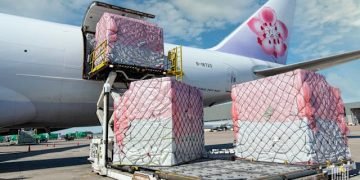Shanghai, China
By Maria Kalamatas | The Logistic News
May 27, 2025 – Section: Air
Air cargo companies in China are facing sharp disruption this week after new U.S. tariff rules came into effect, changing the way small parcels are classified at customs. The move has caused a noticeable slowdown in outbound shipments, particularly those linked to fast-paced e-commerce platforms.
According to logistics operators in Shanghai and Guangzhou, the change triggered immediate adjustments. Freight volumes to American destinations dropped significantly over the weekend, prompting carriers to revise their flight plans and review cargo priorities.
“The new classification system has added layers of clearance and unexpected delays,” said Zhao Liwen, a regional air freight manager in Shenzhen. “We’ve had to pause some scheduled flights and shift resources toward intra-Asia routes.”
Several companies are now diverting their freighters to serve markets in Southeast Asia, where customs handling remains more predictable. Meanwhile, discussions are underway between Chinese exporters and authorities to streamline cross-border procedures and restore reliability on high-value lanes.
The sudden impact has drawn attention across the sector. Airlines that depend on high-frequency, low-weight parcels — particularly from electronics, apparel, and consumer goods brands — are being forced to reconfigure entire service networks.
“It’s not just a dip in volume. It’s a test of flexibility,” noted Angela Ruan, a supply chain consultant based in Hong Kong. “Carriers that can rebalance quickly will gain an edge as the landscape shifts.”
While long-haul routes are being reassessed, domestic and regional flights have picked up volume. Industry insiders expect further route changes over the next two weeks as carriers seek stability in more resilient corridors.
✎ Maria Kalamatas
Senior Correspondent – Aviation & Global Logistics
The Logistic News





















